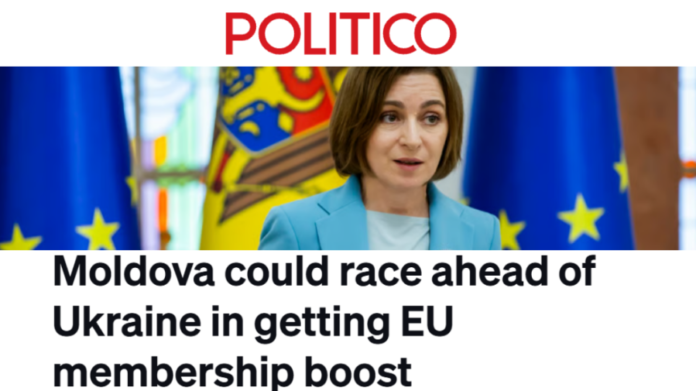The European Union is considering offering the Republic of Moldova a significant advance on its path to EU membership—potentially ahead of Ukraine—according to diplomatic sources cited by Politico. EU ministers plan to discuss the proposal in early September during a meeting of European affairs ministers from member states.
Under the proposed scenario, the EU would open Moldova’s first “negotiation cluster,” a key step in the accession process. This move would mark a first, as Moldova and Ukraine have so far progressed in parallel.
Sources indicate that the initiative could provide a significant electoral boost to President Maia Sandu, whose party strongly supports European integration ahead of parliamentary elections scheduled for late September. At the same time, it would counter Russia’s influence, as Moscow faces accusations of trying to sway the vote toward pro-Russian forces.
Supporters of the initiative believe that accelerating Moldova’s EU path would send a strong message to Moscow. Romanian MEP Siegfried Muresan, who chairs the EU–Moldova Association Committee, emphasized that this step would dismantle Russia’s narrative that no real progress is being made in the accession process.
However, sidelining Ukraine could spark discontent in Kyiv, where EU membership remains a strategic priority—especially amid the ongoing war. A Ukrainian diplomat warned that sending a negative signal at this stage would be a mistake, particularly as global peace talks are underway.
FOR THE MOST IMPORTANT NEWS, FOLLOW US ON TWITTER!
According to the European Commission, both Moldova and Ukraine have met the technical requirements to open their first negotiation cluster. But Hungary continues to block Ukraine’s progress, with Prime Minister Viktor Orban opposing its entry into the EU.
As a result, Moldova could secure consensus from all 27 member states at the General Affairs Council meeting on September 1, while Ukraine cannot expect the same unanimous support. This situation complicates matters for pro-enlargement countries, such as Denmark, which currently holds the rotating EU Council presidency.
EU diplomats are exploring alternative ways to bring Ukraine closer to the EU, including integration into programs like Horizon Europe and Erasmus. These initiatives would offer tangible benefits even without formal progress in accession talks.
Decision-makers stress that the situation could shift quickly, depending on the outcome of international discussions—including the upcoming meeting between Donald Trump and Vladimir Putin in Alaska. A potential political agreement could lift Hungary’s veto on Ukraine’s candidacy.
Meanwhile, some officials argue that aligning Moldova and Ukraine in their EU bids is crucial for Ukraine’s morale and could improve chances of securing a favorable global peace agreement. For now, the decision to advance Moldova ahead of Ukraine remains open and hinges on geopolitical developments in the coming weeks.


